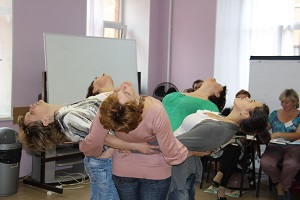
Many people intrinsically understand how children might respond to dramatherapy, but are more less aware of the application of dramatherapy for adults. The Health and Care Professions Council of the UK defines dramatherapy as a unique form of psychotherapy in which creativity, play, movement, voice, storytelling, dramatization and the performance arts have a central position within the therapeutic relationship.
It is a form of therapy that engages the whole person – in body, mind and spirit. It is true to its name in that it brings dramatic tools and language to serve a therapeutic process. This is unique to every individual. Dramatherapy can tap into any of the aspects that are developed in drama such as stories, scenography, movement, improvisation, rhythm, imagination, props, voice, masks and puppets. The therapist will bring her experience and knowledge of different dramatic forms to support what would best suit the client.
This serves a client to learn more about themselves and consequently be more able to function to their best potential in their everyday life; it supports shifts where the client may feel stuck; it serves to release and give expression to blocked emotions. This is supportive to people who may be experiencing a mental health condition such as depression or an eating disorder. It is supportive to people going through a particular painful phase in their life such as bereavement, or struggling to find meaning in a new phase of life such as older age, and also supportive to people looking for a better quality of life.
THE DRAMATHERAPY APPROACH
Dramatherapy is an action therapy. This means that as dramatherapists we believe that the healing is most powerful when the body is also engaged in doing through enactments, improvisation, movement and sculpting (a technique in which the actor creates a shape with their body to form a still image that allows one to feel and see the moment or situation portrayed in the sculpt that can give insight and allow for changes). Some clients need time before being able to engage in physical expression and this is where the therapist would introduce projective techniques such as creating and discovering meaning through miniatures and objects; creating stories and exploring meaning through images; and giving voice to masks or puppets.

WHO CAN BENEFIT?

DRAMATHERAPY FOR ADULTS WITH A
MENTAL HEALTH CONDITION
Dramatherapy helps people suffering from mental health conditions including eating disorders, depression and schizophrenia. It uses creative media to tap into the healthy parts of the person. The process does not rely on words and is therefore beneficial to people who struggle to express themselves cognitively or verbally.

DRAMATHERAPY FOR ADULTS LOOKING
FOR PERSONAL GROWTH
Dramatherapy can support you in developing your awareness of your way of being and relating to others. It works by helping you to accept yourself at a deeper level, therefore growing in confidence and self-esteem. The process will help you to relate better with others, to take decisions with more clarity and to nourish your full potential.

DRAMATHERAPY FOR ADULTS WITH
AN INTELLECTUAL DISABILITY
Dramatherapy supports adults with an intellectual disability. It helps them to develop themselves and their skills in being with others. The process helps to develop communication skills, improve self-expression and nourish relational connection. It uses a variety of creative media and does not rely on the verbal.
